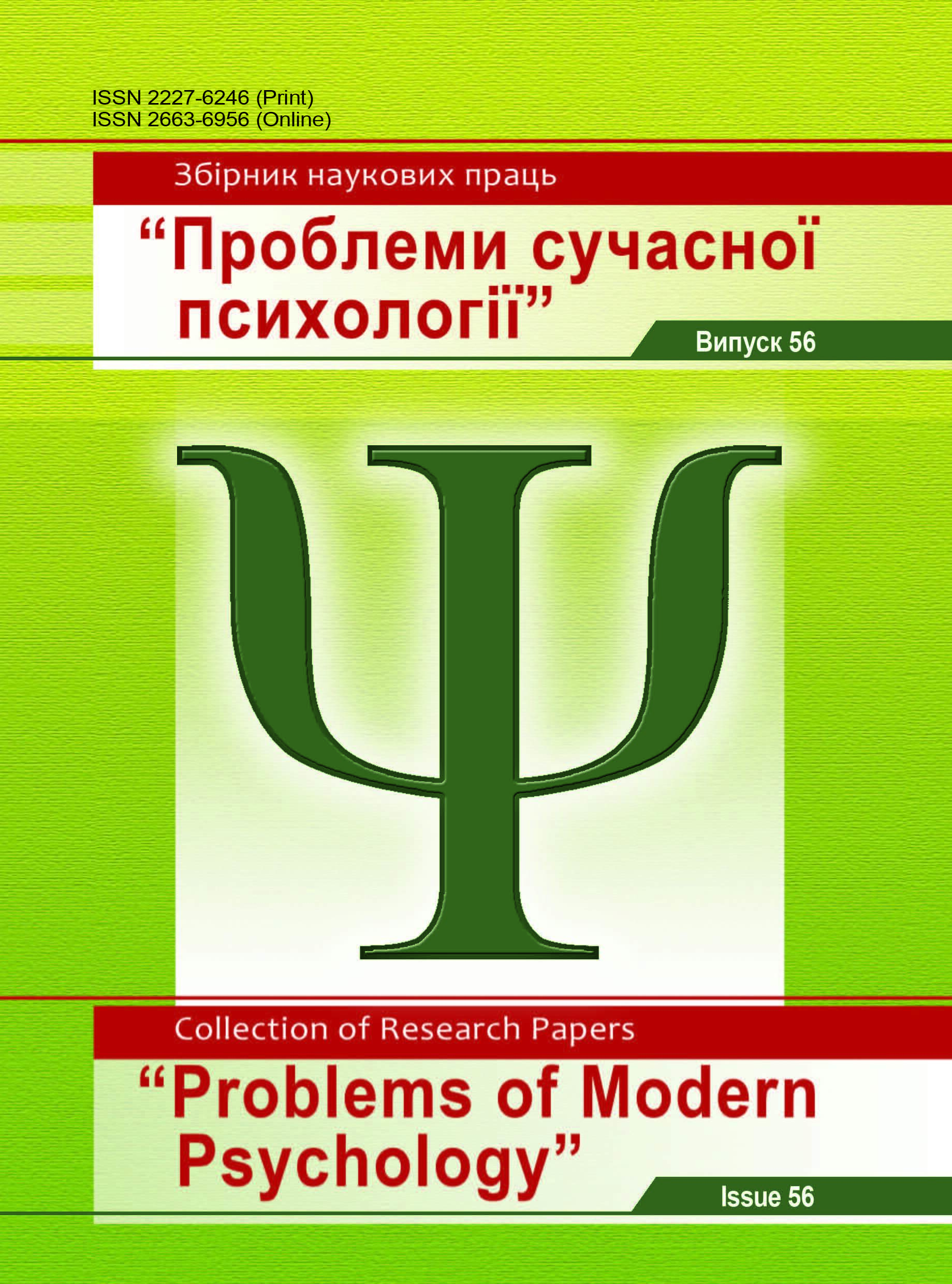Communicative and Quasi-Communicative Techniques to Develop Students’ Communicative Competence
DOI:
https://doi.org/10.32626/2227-6246.2022-56.64-84Keywords:
communicative competence, communicative techniques, quasi-communicative techniques, quasi-communication, professional activity, professional opportunities, monologue speech, dialogue speechAbstract
The purpose of our article is: to describe communicative and quasi-communicative techniques to develop students’ communicative competence; to show the reasons for bad quasi-communication; to describe the types of exercises that are inherent to each of the stages of the development of communicative competence of students of philological faculties; to show how the professional development of students, future translators, depends on their communicative competence.
Methods of the research. The following theoretical methods of the research were used to solve the tasks formulated in the article: a categorical method, structural and functional methods, the methods of the analysis, systematization, modeling, generalization.
The results of the research. Professional activity is one of the most important ways for everyone to connect with the world, and for many people it is a real factor in building relationships with others. So, the main importance of leading activities in determining the life path of each individual is that it opens a person’s guidelines for inclusion him/her into new spheres of life in the society, introduces it to new social structures and allows to establish even more and the quality of social ties.
Conclusions. The professional development is presented as a sequence of certain specific phases that differ by content and the form of presentation of professional desires. The way of career should be divided into five stages: growth, search, strengthening, stabilization and decline. The period of choosing a profession and the professional development is the second stage of this five-step model, which covers the age of 14 to 25 years and is characterized by the fact that the individual performs professional activities in different roles, focusing on his/her real professional opportunities. We should also note that professional development is understood by us quite broadly: it is the formation of a person’s idea of his/her professional career, and preparation for future professional activity, the initial process of professional activity and the whole career path, change in a career and retirement. The professional development of students, future translators, depends on their communicative competence that in a great degree depends on the processes of real, natural communication, which can be presented in a monologue and a dialogue forms, and also on the process of quasi-communication.
References
Aleksandrov, A.A., Memetova, K.S., & Stankevich, L.N. (2020). Referent’s Lexical Frequency Predicts Mismatch Negativity Responses to New Words Following Semantic Training. Journal of Psycholinguistic Research, 49, 187-198. Retrieved from https://doi.org/10.1007/s10936- 019-09678-3.
Batel, E. (2020). Context Effect on L2 Word Recognition: Visual Versus Auditory Modalities. Journal of Psycholinguist Research, 49, 223-245. Retrieved from https://doi.org/10.1007/s10936-019-09683-6.
Bates, D., Maechler, M., Bolker, B., & Walker, S. (2014). lme4: Linear mixed-effects models using Eigen and S4. Journal of Package Version, 1(7), 1-23.
Honcharuk, Nataliia, & Onufriieva, Liana (2018). Psykholohichnyi analiz rivniv pobudovy komunikatyvnykh dii [Psychological analysis of the levels of construction of communicative actions]. Psycholinguistics. Psykholinhvistyka. Psikholingvistika - Psycholinguistics. Psycholinguistics. Psycholinguistics, 24(1), 97-117. Retrieved from https://doi.10.31470/2309-1797-2018-24-1-97-117 [in Ukrainian].
Ivashkevych, Ed., & Koval, I. (2020). Psychological Principles of Organization of the Deductive Process at the English Lessons at Secondary Schools. Zbirnyk naukovykh prats «Problemy suchasnoi psykholohii» - Collection of research papers “Problems of modern psychology", 50, 3152. Retrieved from https://doi.org/10.32626/2227-6246.2020-50.31-52
Maksymenko, S., Tkach, B., Lytvynchuk, L., & Onufriieva, L. (2019). Nei- ropsykholinhvistychne doslidzhennia politychnykh hasel iz zovnish- noi reklamy - A neuropsycholinguistic research of political slogans from outdoor advertising. Psycholinguistics. Psykholinhvistyka. Psik- holingvistika - Psycholinguistics. Psycholinguistics. Psycholinguistics, 26(1), 246-264. https://doi.10.31470/2309-1797-2019-26-1-246-264 . Retrieved from https://psycholing-journal.com/index.php/journal/article/view/715 [in Ukrainian].
Mykhalchuk, N., & Bihunova, S. (2019). The verbalization of the concept of “fear” in English and Ukrainian phraseological units. Cognitive Studies | Études cognitives, Warsaw (Poland), 11. Retrieved from https://doi.org/10.11649/cs.2043.
Mykhalchuk, N., & Ivashkevych, E. (2019). Psycholinguistic Characteristics of Secondary Predication in Determining the Construction of a Peculiar Picture of the World of a Reader. Psycholinguistics. Psykholinhvistyka. Psikholingvistika - Psycholinguistics. Psycholinguistics. Psycholinguistics, 25(1), 215-231. Retrieved from https://doi.10.31470/2309-1797-2019-25-1-215-231.
Mykhalchuk, N., & Onufriieva, L. (2020). Psychological Analysis of Different Types of Discourse. Zbirnyk naukovykh prats «Problemy suchasnoi psykholohii» - Collection of research papers “Problems of modern psychology", 50, 188-210. Retrieved from https://doi.org/10.32626/2227-6246.2020-50.188-210.
Downloads
Published
How to Cite
Issue
Section
License
Copyright (c) 2022 Ivashkevych Ernest

This work is licensed under a Creative Commons Attribution-NonCommercial 4.0 International License.
Copyright
The Editorial Board has the full right to publish original scientific papers containing results of theoretical and experimental research works which are not currently subject to review for publication in other scientific editions. The Author shall transfer to the editorial board of the Collection the right to spread the electronic version of the paper, as well as the electronic version of the paper translated into English (for papers originally submitted in Ukrainian and Russian) by all kinds of electronic means (placement at the official website of the Collection, electronic databases, repositories etc).
The Author of an article reserves the right to use materials of the paper, without approval with the editorial board and the founders of this Collection: a) partially or fully, for educational purposes; b) for writing own dissertation papers; c) for preparation of abstracts, conference reports and presentations.
The Author of an article can place electronic copies of the paper (including the final electronic version downloaded from the official website of the Collection) at:
- personal web resources of all Authors (websites, webpages, blogs etc.);
- web resources of the institutions where the Authors are employed (including electronic institutional repositories);
- non-profit public access web resources (for example, arXiv.org).
But in all cases, it is obligatory to have a bibliographic reference to the paper, or a hyperlink to its electronic copy placed at the official website of this Collection.






